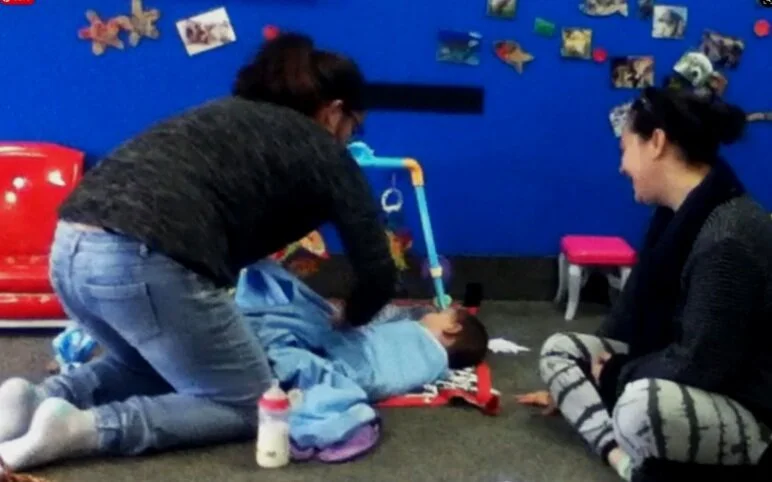
Ngā whakawhitinga tuatahi
First transitions into ECE
What works?
Ēhara tāku toa i te toa takitahi, ēngari he toa takitini.
I come not with my own strengths but bring with me the gifts, talents and strengths of my family, tribe and ancestors.
- Here Huata (Ngāti Kahungunu).
Pēpi often arrive in ECE services before their first birthday and come with well-established rhythms of knowing, doing and being from home. Taking time to generate positive āhua that contributes to the wairua of the space and relationships with pēpi and their whānau are central to this first transition so that feelings are acknowledged and individual preferences are upheld at all phases of the process.
To help you best support both pēpi and whānau in this first transition, we have outlined some things to think about and implement before the first day, on the day itself and after the first day.
“It’s āhua, it’s not a language, it’s a feeling… you know you feel that, it’s like coming home, you know when you come home and you just feel (makes a breathy, relaxed sound)… it’s a feeling in yourself… it’s a feeling that, so you can learn, you’re not going to learn if you’re scared, it you’re not comfortable, you’re not happy, you’re not free to do and explore”
- Parent, Immersion ECE
Mōhiotanga: Before the first day
Mātauranga: During the first day
Māramatanga: After the first day

Resources for further reading
Dalli, C., & Aspden, K. (2021). What is specialist about infant and toddler practice. The Education Hub.
Education Scotland. (2016, January 14). Pre- birth to three: Professor Aline-Wendy Dunlop - transitions [video]. YouTube.
Everiss, L., & Hutt Family Day Care. (2010). Transitions and home-based care: A literature review. In A. Meade (Eds.), Dispersing Waves: Innovation in early childhood education (pp. 49-56). NZCER.
Gaffney, J., Ritchie, J., Skerrett, M (Ngā Tahu, Ngāti Mahuta, Ngāti Unu, Ngāti Pikiao, Ngāti Pukeko)., Smith, G (Ngāti Apa, Ngāti Kahungunu, Te Aitanga a Hauti, Kāti Māmoe)., Mara, D (Tahitian?English)., Macfarlane, A (Ngāti Rangiwewehi, Ngāti Whakaue)., & Sleeter, C. (2021). Imagining possible worlds with young children, families, and teachers: Sustaining Indigenous languages and family pedagogies. Kōtuitui: New Zealand Journal of Social Sciences Online, 16(2). https://10.1080/1177083x.2021.1958877
Matapo, J., Faasaulala Tagoilelagi-Leota, S. & Utumapu-McBride, T. (2021). Pepe meamea: Embedding Samoan indigenous philosophy for ECE for Samoan children under two: ECE Hub Webinar. The Education Hub.
Mika, C., & White E.J. (2019). Ngā mokopuna kei te hāereere: Becoming in Aotearoa Curriculum – The First 1000 Days. In M. Gradovski, E. Eriksen-Odegaard, N. Rutanen, J. Sumsion & E.J. White. (Eds.). Beginning becoming: The first 1,000 days (55-72). Springer.
RMIT University (2021). First steps: Supporting quality transitions to early childhood settings in the first 1000 days.
White, E.J., Rutanen, N., Marwick, H., Souza Amorim, K., Karagiannidou, E., & Herold, H. (2020). Expectations and emotions concerning infant transitions to ECEC: International dialogues with parents and teachers. European Early Childhood Education Research Journal, 28(3), 363–374.
* White, E.J., Hansen, K., Hawkes, K., Redder, B., Lord, W., Perks, N. (2018). Key teaching (primary caregiving?) practices during infant transitions to ECEC in Aotearoa New Zealand. The First Years: Ngā Tau Tuatahi. New Zealand Journal of Infant and Toddler Education, 20(2), 5-14.
White, E. J., Westbrook, F., Hawkes, K., Lord, W., & Redder, B. (2021). (In)visible perceptions of objects (‘things’) during early transitions: Intertwining subjectivities in ECEC. Contemporary Issues in Early Childhood, https://doi.org/10.1177/14639491211027904
White, E. J., Marwick, H., Amorim, K., Rutanen, N., & Herold, L (Eds.) (2022). First transitions to early childhood education and care: Culturally responsive approaches to the people, places, environments and ideologies of earliest care encounters across six countries. In Policy and Pedagogy with Under-three Year Olds: Cross-disciplinary Insights and Innovations series. Springer.































